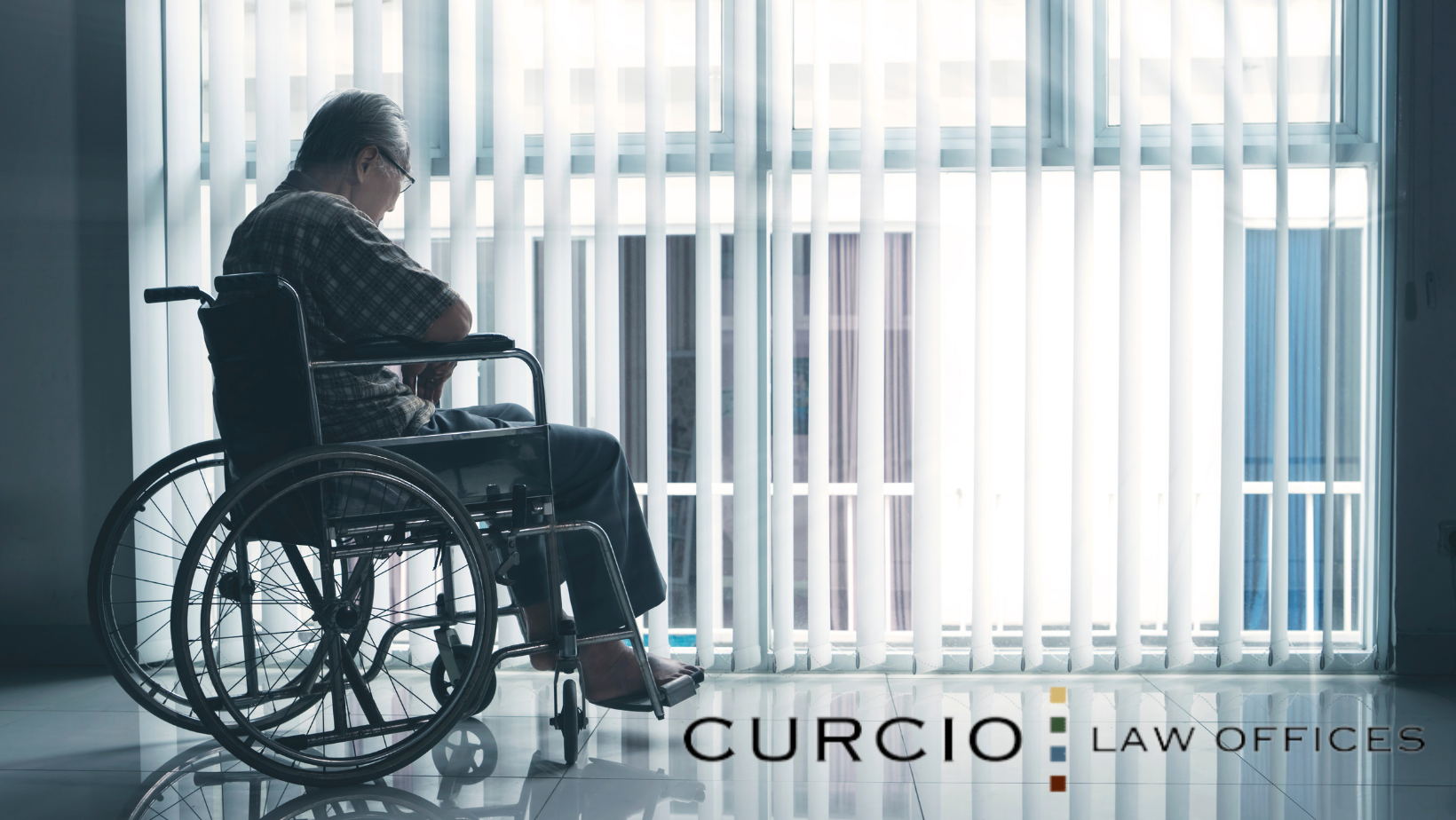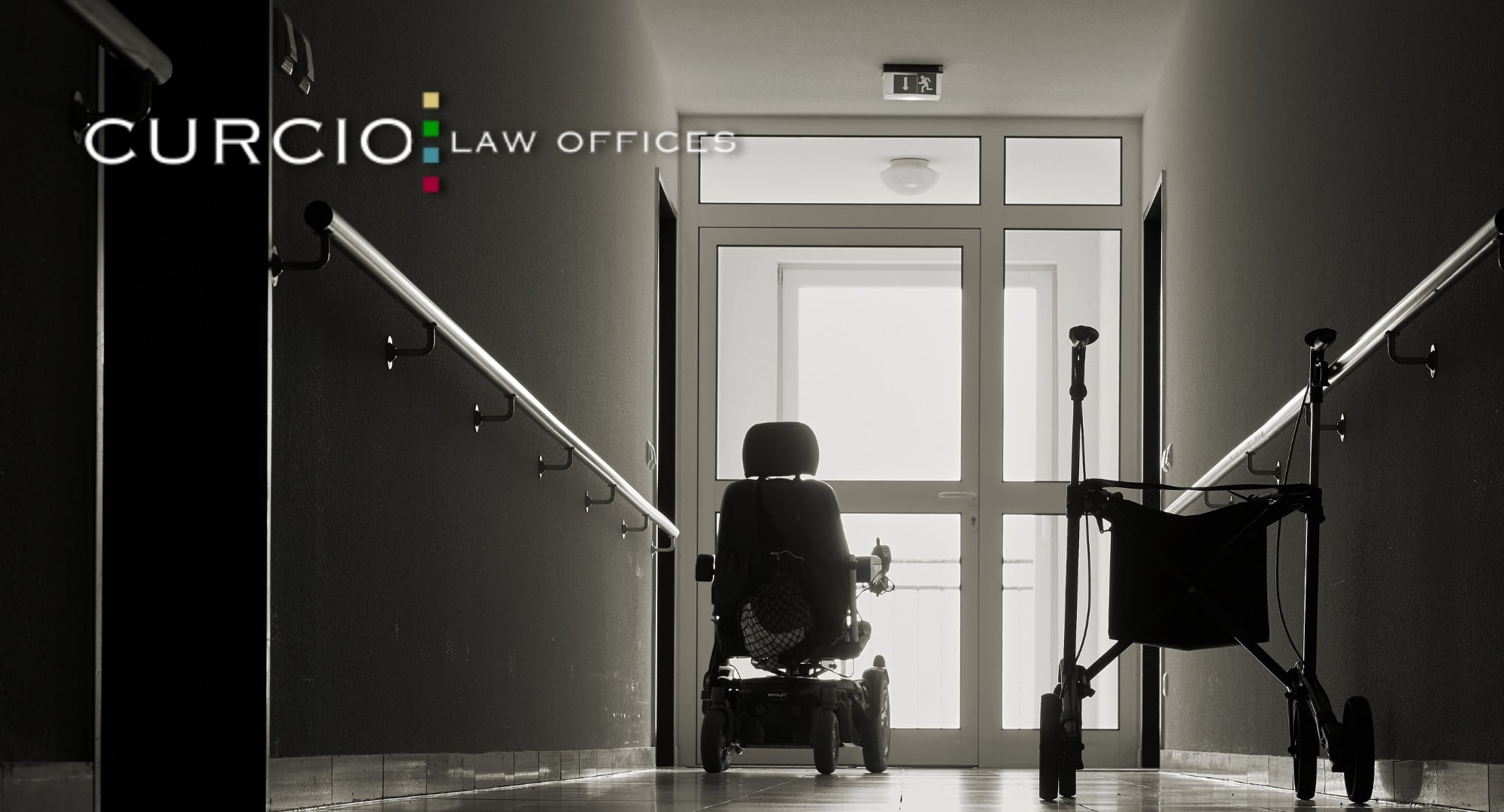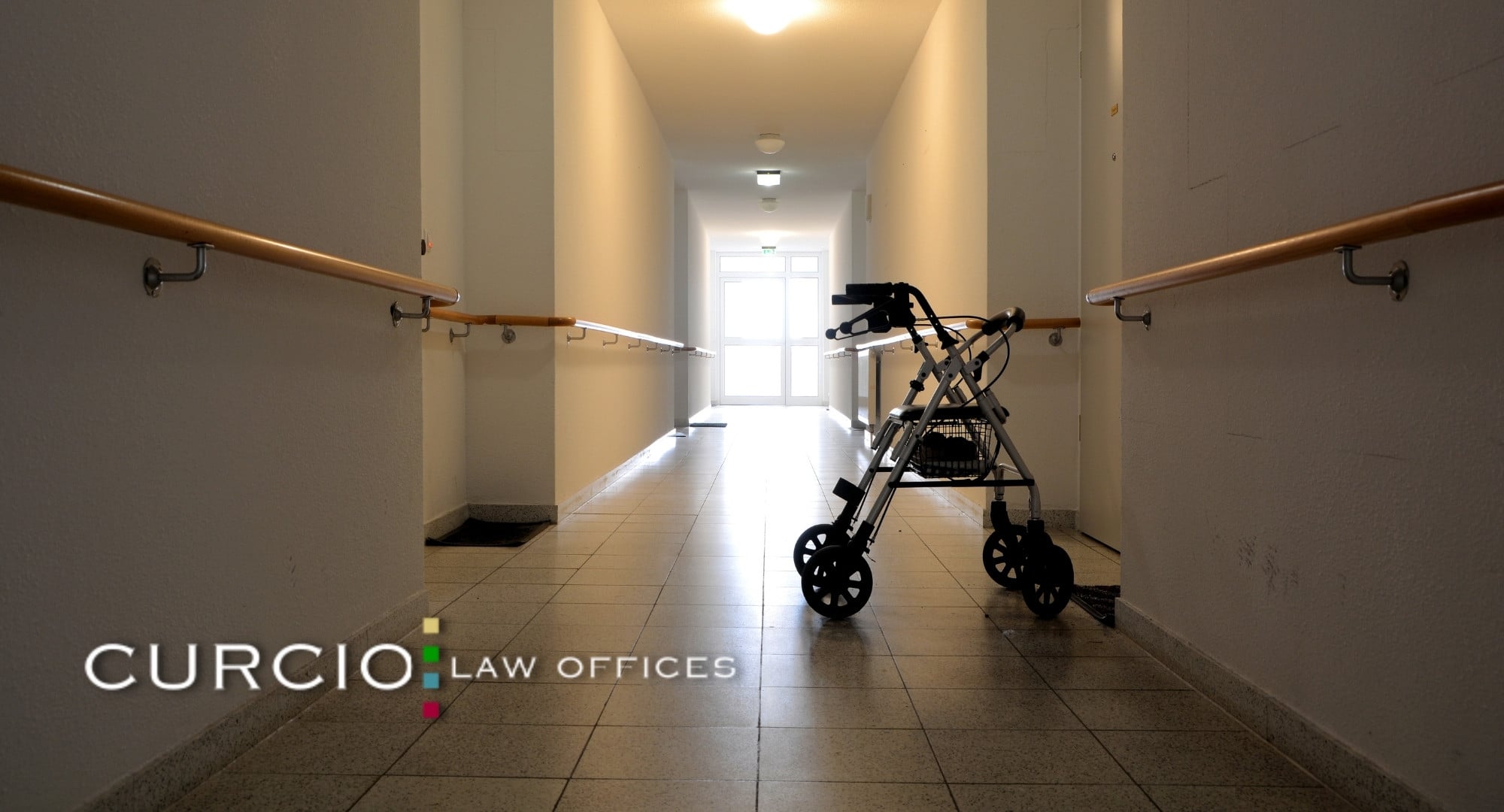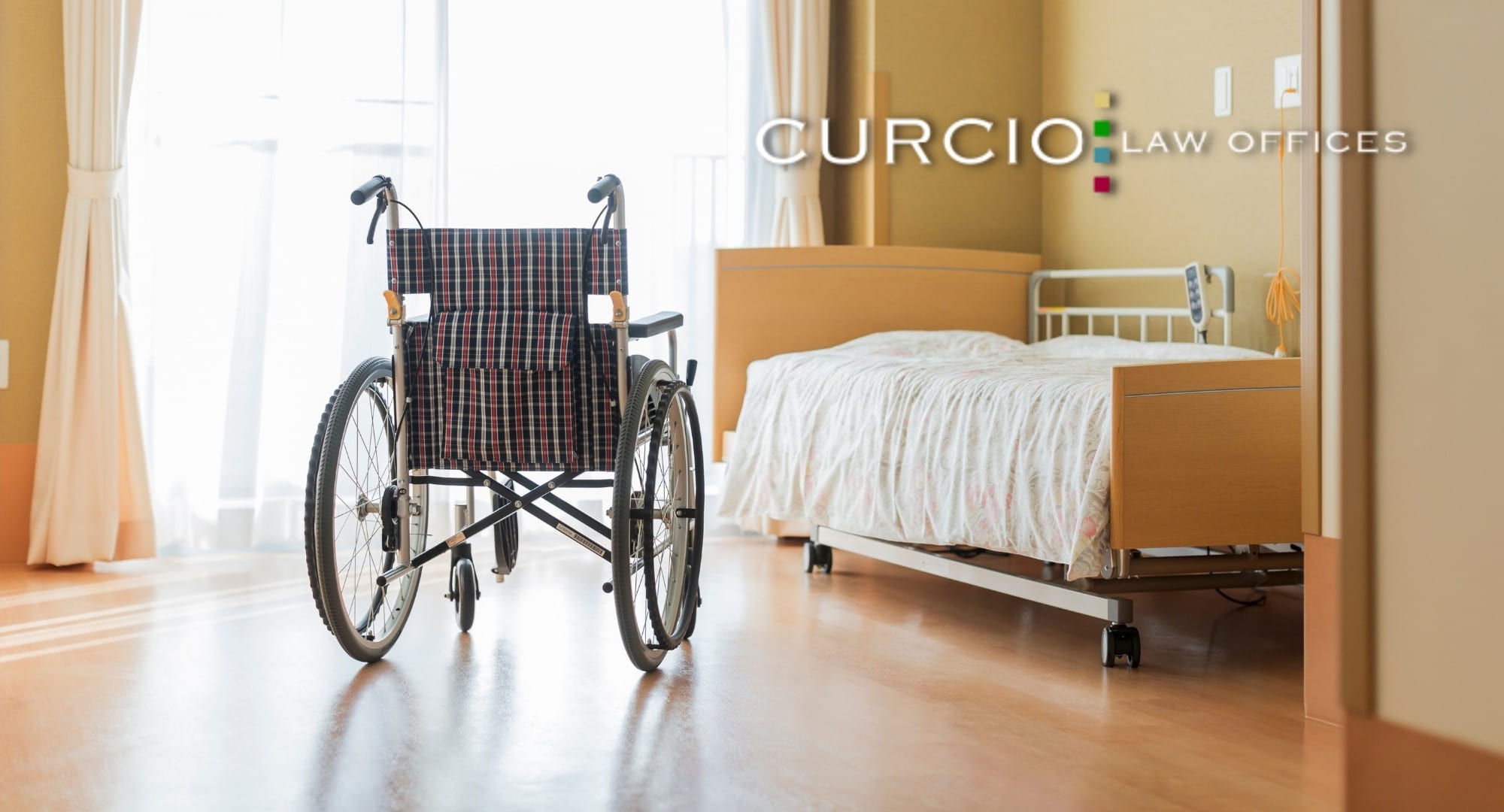CHICAGO NURSING HOME ABUSE LAWYER
PRACTICE AREAS
Chicago Nursing Home Abuse Attorney
When you entrusted the nursing home with the care of your family member or loved one, you had every right to believe the living facility would provide the compassionate and attentive care your loved one deserves. If you now suspect nursing home abuse or neglect, regrettably, you are not alone. Clients in Chicago and throughout Illinois have suffered as a result of nursing home abuse or elder abuse in assisted living facilities.
At Curcio & Casciato, our Chicago elder abuse attorneys try to provide families with a way out. We represent our clients with the same compassion that we’d represent our own with. Call an experienced Chicago nursing home abuse lawyer on behalf of your loved one if you suspect abuse has taken place in a Chicago nursing home or assisted living facility.

llinois Nursing Home Abuse and Neglect
Every year, 1 out of every 4 nursing homes is cited for causing a serious injury or death of one of their nursing home residents.
State and federal regulations, such as the Illinois Nursing Home Care Act, have been enacted to protect the elderly and disabled. But, it takes involvement by people − family members, such as yourself − to fight back against the abusers in Chicago nursing homes to get the justice your loved one deserves.
There are many types of negligence, from emotional abuse and financial abuse to physical abuse.
The elderly and disabled are particularly vulnerable, as the signs of nursing home abuse may be subtle. However, recognizing the common signs of elder abuse and nursing home neglect can increase your chances of early intervention and prevent further harm to your loved one.
If you suspect abuse to Illinois nursing home residents, you’ll need fast and efficient action to help your loved one not only recover from the physical injuries sustained as a nursing home resident but also to help your loved one recover from any trauma he or she incurred from nursing home abuse or neglect.
Trust your instincts. You know your loved one better than any person who may be looking after them. Many times, nursing home abuse victims will remain silent to avoid problems out of fear.
At Curcio & Casciato, our Chicago personal injury lawyers have more than 50 years of experience advocating on behalf of those who have suffered nursing home abuse and neglect in the Chicago area. Our track record for nursing home abuse cases is solid.
You won’t need to pay legal fees at Curcio Law Group unless your case is successful.
What Constitutes Nursing Home Neglect in Chicago?
Neglect in a nursing home is a type of elder abuse. Abuse and neglect are often used interchangeably concerning abuse that occurs in nursing facilities. Nursing home neglect usually involves some type of substandard care in nursing homes. This may also include a breach of duty that directly or indirectly harms an elderly resident.
Common situations for nursing home negligence that have been witnessed by our law firm, as well as the Illinois Department of Health Services and Adult Protective Services, include dehydration, malnutrition, elopement, poor personal hygiene, medication errors, consistent verbal abuse, lack of diabetic medical care, failure to maintain accurate medical records, frequent physical injuries, and unexpected death.
Types of Nursing Home Abuse in Chicago

Chicago nursing home abuse can take on many forms. Some types of abuse in nursing homes involve intentionally malicious behavior, while other forms of nursing home abuse may just stem as a consequence of the nursing home’s condition.
Concerning elder abuse, every type of abuse should be taken seriously and immediately addressed.
Types of Chicago nursing home abuse include:
Mental Abuse
This refers to any action or inaction that hurts the mental health of a nursing home resident. Mental abuse is one of the more complex types of abuse to detect, as it will take a witness to report it.
Physical Abuse
This refers to any form of physical harm a nursing home resident will experience while in the care of the nursing facility. Although physical abuse to an elderly family member may not always leave noticeable signs, it will still have a serious impact on their overall health.
Emotional Abuse
This type of abuse involves hurting a resident’s emotional state. This can occur intentionally when nursing home employees purposely remove anything that makes a resident happy. Sadly, this happens quite often in nursing home abuse and neglect cases.
Our Chicago emotional distress attorneys have extensive experience with emotional abuse cases.
Social Abuse
This involves limiting the senior’s ability to interact with others. Over time, this can and will hurt your loved one’s mental and emotional state.
Financial Abuse
This involves taking a nursing home resident’s credentials and using them to access bank accounts, credit card accounts, or any other financial accounts and take their money.
Sexual Abuse
While no one wants to think about this occurring in nursing homes, women and residents with dementia are more likely to become victims of sexual abuse. Sexual abuse can occur at the hands of a nursing home staff member, nurse, or aid, from a criminal or family member or another resident, or from another resident.
Wrongful Death
Sadly, abuse and nursing home negligence can lead to the death of your loved one. If your family is searching for answers, our firm can walk you through the necessary steps to file a wrongful death lawsuit in Chicago.
Addressing these types of abuses commonly seen throughout Illinois nursing homes may be difficult for family members to prove without the help of an experienced nursing home abuse attorney.
How Do You Prove Nursing Home Abuse and Neglect?

If you suspect that a loved one who’s living in a nursing home suffered abuse or neglect, you may feel as if it’s impossible to prove any type of misconduct occurred. This is especially true if your loved one suffers from Alzheimer’s or dementia and has difficulty communicating.
In order to prove abuse or negligence in a nursing home case, you will need evidence that proves the nursing home acted in a way that it should not have or failed to take appropriate action when necessary. Consulting with an experienced Chicago nursing home abuse lawyer will provide you with a perspective on how to move forward. Our law firm has extensive experience litigating nursing home abuse and personal injury cases in general. We’ll let you know the best way to move forward if you suspect neglect or abuse in any of the Chicago area nursing homes.
What Does Nursing Home Abuse Look Like?
General warning signs of abuse and negligence may include frequent arguments between the patient and the caregiver, the staff’s refusal to allow visitors to be alone with the patient, or an unusually long delay before the nursing home permits the visitor to see the patient. As a clear-minded advocate for your loved one, you should be given the option to refuse medical treatment on behalf of your loved one who is residing in a nursing home. If you see that your loved one is overly medicated any time you visit, speak with your own doctor, or if the resident has a doctor outside of the living facility that you trust, ask them about specific medications.
Signs of Nursing Home Abuse or Neglect
More evident signs of nursing home abuse and neglect may include any of the following:

Nursing Home Bed Sores
Bed sores, or pressure ulcers, are a common yet preventable issue in nursing homes, often resulting from prolonged immobility. Our Chicago bed sore lawyers at Curcio Law Group understand the severity of complications of immobility in Chicago nursing homes, particularly when it leads to stage four bedsores. The pressure ulcer staging system helps in assessing the severity, but the stage 4 bedsore life expectancy is significantly reduced and may constitute medical malpractice or even wrongful death if not properly managed.
Choking Injuries in Nursing Homes
Choking injuries are a serious concern in nursing facilities, often due to inadequate supervision by nursing home employees or improper dietary management. Our nursing home abuse lawyers are committed to representing victims of choking injuries in Chicago nursing homes, advocating for the necessary changes to prevent future incidents, and ensuring every affected nursing home resident receives the compensation they deserve.
Nursing Home Falls
Falls in nursing homes can lead to severe injuries or fatalities, especially without proper fall risk assessments. As Chicago nursing home falls lawyers, Curcio Law Group focuses on cases where inadequate fall prevention measures have led to harm, working tirelessly to secure justice for injured residents and their families.
Nursing Home Infections
Infections, including pneumonia in the elderly, are common in nursing homes but often preventable with proper care. Our Chicago nursing home infections lawyer team addresses cases where neglect has led to serious infections, ensuring affected residents and their families receive the compensation and justice they deserve.
MRSA
MRSA, a type of staph infection resistant to many antibiotics, poses a significant risk in nursing homes. The Chicago personal injury attorneys at Curcio Law Group are experienced in handling cases of MRSA in Chicago nursing homes, advocating for improved infection control practices, and representing those affected by such outbreaks.
UTIs
Urinary Tract Infections (UTIs) can lead to serious health complications in elderly residents, including UTI delirium. Our nursing home abuse attorneys represent clients suffering from UTIs in Chicago nursing homes due to inadequate care, ensuring they receive the attention and compensation they need.
Malnutrition in Nursing Homes
Malnutrition is a critical issue in nursing homes, exacerbated by inadequate care plans for diabetic patients. Curcio Law Group addresses cases of malnutrition in Chicago nursing homes, advocating for proper nutritional management and care for all residents.
Medication Errors
Medication errors can have devastating effects on nursing home residents. Curcio Law Group emphasizes the importance of antibiotic stewardship for nursing homes and tackles cases involving medication errors in Chicago nursing homes, striving to mitigate the consequences of medication errors for affected Illinois nursing home residents.
Sepsis in Nursing Homes
Sepsis is a life-threatening response to infection that can escalate quickly if not properly managed. Our Chicago nursing home sepsis attorneys are knowledgeable about the three stages of sepsis and represent clients who have suffered due to negligence in identifying and treating sepsis in a timely manner.
New STD Diagnosis
Sexual abuse cases are rare but sometimes revealed through a new diagnosis of a sexually transmitted disease in a nursing home patient.
Unreasonable Restraint
The use of restraints in nursing homes should be minimal and always justified. Curcio Law Group’s Chicago unreasonable restraint lawyers fight against the unnecessary use of physical or chemical restraints, recognizing the psychological impact, such as relocation stress syndrome, on residents.
Nursing Home Elopement
Elopement, or the unauthorized departure of a resident from a nursing home, poses serious risks. Curcio Law Group addresses cases of nursing home elopement in Chicago, ensuring facilities implement adequate safety measures and supervision to prevent such incidents and protect residents.
Lack of Protection from Other Nursing Home Residents Suffering from Mental Illness
Family members should hold their loved one’s nursing home accountable for any injuries sustained as a result of lacking medical care, and abuse by nursing home staff members, as well as other nursing home patients.
Many nursing homes receive money from the state, as well as payment from elderly residents. Ensuring that the nursing home is staffed enough to properly take care of residents and maintain their safety should be a priority. When Chicago nursing home understaffing occurs, a Chicago nursing home abuse lawyer can help subtly or not so subtly remind the facility of its obligations to the residents.

What To Do If You Suspect Nursing Home Neglect
How to Report Nursing Home Neglect in Illinois
If you don’t wish to file a nursing home abuse lawsuit at this time and just need to know how to report nursing home abuse, you can speak with the Illinois Department of Public Health at 1-800-252-4343 or work with a local nursing home ombudsman.
Some families prefer to transfer their loved ones away from the nursing home. We provide in-depth help here: How to remove a patient from a nursing home in Illinois.
Our personal injury attorneys are often asked, “Are granny cams legal?” While those are legal in Illinois, they cannot always protect your loved one from serious abuse and neglect.
However, Chicago nursing home abuse lawyers, like the ones at Curcio Law Firm, offer a free consultation, following up with the concerned family member with whom we spoke, and will do our best to ensure your loved one gets the attention he or she needs.
Nursing Home Abuse Lawsuit
You can sue a nursing home for elder abuse if caretakers provided sub-standard care that caused harm to a resident. In this case, there may be a valid medical malpractice case against the nursing home facility. In some cases, family members can also file a claim against the individual medical professional who treated the resident.
Any time a loved one suffered injuries as a direct or indirect result of lacking Illinois nursing home care, responsible parties can and should be held accountable, even if your loved one didn’t sustain life-threatening injuries. Every nursing facility should be held accountable, and many times, a concrete nursing home abuse case will help ensure other residents remain safe, if only for a brief period of time.
Does Patient Negligence Apply to Nursing Home Abuse Cases in Illinois?

Patient negligence occurs when a patient’s own negligence causes them harm, rather than the doctor or physician’s negligence.
We’re often asked, “What are the chances of winning a medical malpractice suit when it comes to nursing home abuse or neglect?” And while nursing homes are, in fact, entitled to offer defenses for their actions or inaction, this defense may not hold up in court. This is especially the case if an elderly person is placed in an assisted living facility because he or she needs protection from the effects of certain medical conditions, such as Parkinson’s disease or dementia.
Our Chicago nursing home abuse lawyers know how to prove medical malpractice and nursing home neglect.
How Long Does a Nursing Home Lawsuit Take?
We’re also asked, “How long does a medical malpractice case take?“
The Illinois medical malpractice statute of limitations is 2 years, so you’ll need to ensure you’ve filed your nursing home abuse claim within that timeframe. In most cases, you should expect for the entire process to last for 6 months to a year.
In order to get the ball rolling, you’ll need to speak with a Chicago nursing home abuse lawyer from Curcio Law Group. After this, you can expect your attorney to conduct an in-depth investigation of your nursing home abuse claims. Once we determine the medical standard of care wasn’t upheld, we’ll determine whether informed consent applies to your cause and consult with medical expert witnesses to better understand the full value of your nursing home abuse claim.
Next, he or she will notify the appropriate nursing home with a Notice of Claim and then file a nursing home abuse suit with the court. Once your attorney files the lawsuit, the court will serve the defendant with the lawsuit and a citation. The case will then move to discovery. In the next stage, the parties may elect to have a mediation and settlement or go to trial.
The attorneys at Curcio Law offices will be able to provide you with a more specific outline of the process after your free initial consultation.
Average Nursing Home Neglect Settlement

It’s challenging to provide any concrete amount of money for any nursing home lawsuit, nursing home settlement, or wrongful death lawsuit without knowing the particulars of the harm and degree of negligence. To determine an accurate estimate of what an Illinois nursing home abuse lawsuit or settlement would bring, you need to speak with a trusted nursing home abuse attorney. The attorney-client relationship ensures that your information will remain private until it’s in your loved one’s best interest to file the abuse claim.
If your loved one died from nursing home abuse or neglect, contact the compassionate Chicago nursing home wrongful death lawyers at Curcio Law Group.
Suspect Nursing Home Abuse or Neglect? Our Nursing Home Abuse Lawyers Can Help
At Curcio & Casciato, we have over 50 years of experience helping families whose loved ones have suffered as a result of nursing home abuse and neglect. If you suspect your loved one was hurt while in a Chicago, Illinois, nursing home or living facility, please call our legal team for advice and guidance. For a free consultation, call 312-321-1111 or contact us online and schedule a free consultation today.


